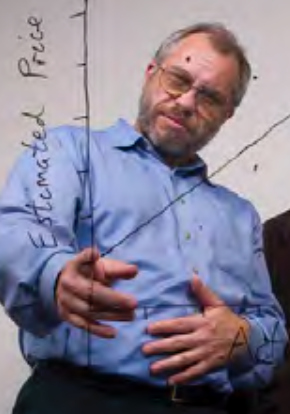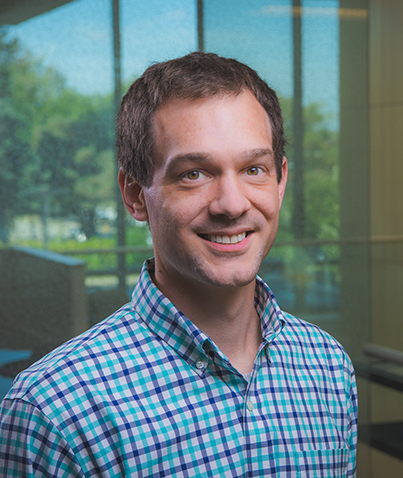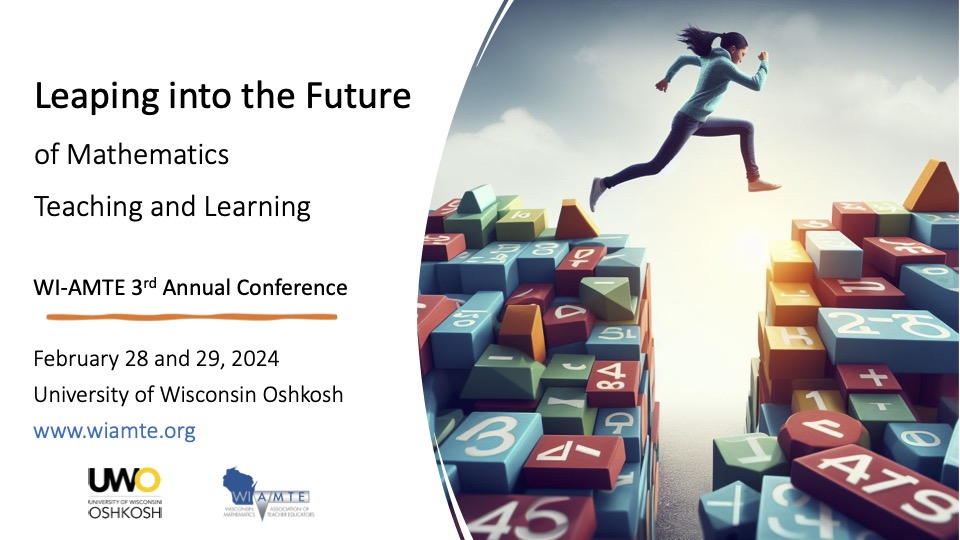PDF version of the Conference Program
Wednesday February 28: 5:00 pm – 9:00 pm
Keynote Address by Kevin McLeod, UW Milwaukee
5:00-5:30 pm, Sage Hall 1210
Why We Love Mathematics. These are interesting times to be a mathematics educator. The consequences of the COVID-19 pandemic are still not yet fully understood; there is a growing emphasis on, and increased pressure on us to design, courses which are relevant to students’ future career plans; and mathematics education at all levels is struggling to recruit teachers. At times like these, it is worth reminding ourselves why we entered this profession, and why, despite everything thrown at us, we still love it. In this session we will explore some of the rewards we have collectively experienced as mathematics educators, and will discuss examples of mathematics that we might use to inspire our students, even if they are not directly “relevant” to their future careers.
Kevin McLeod is an Associate Professor of Mathematics at the University of Wisconsin Milwaukee. He earned his PhD in Mathematics from the University of Minnesota with a thesis in which (he likes to say) he proved that there can only be one bubble of water vapor in a pan of boiling water. He has been involved with several NSF- and UW System-funded projects in in mathematics education, most-notably the ambitious Milwaukee Mathematics Partnership which saw significant improvement in mathematics achievement for students in Milwaukee Public Schools. Since 2021 he has also served as co-chair of the UW-System Math Initiative’s Math Steering Committee.

Plenary Talk by Seth Meyer, St. Norbert College
5:45-6:30 pm, Sage Hall 1210
Slide rules and calculators: where does AI fit in? This talk will explore how artificial neural networks work and describe their uses in large language models (e.g., ChatGPT), image generation (e.g., DALL-E), and similar applications involving content generation. We will then discuss the ethics involved in writing, training, and using these systems. Finally, we will discuss some of the history of technology adoption in mathematics education and explore some of the implications of AI for teaching.
Seth Meyer is a Professor of Computer Science and Mathematics at St. Norbert College in De Pere who teaches courses in computer science, mathematics, and math education. He received his Ph.D. in Mathematics from the University of Wisconsin-Madison and has published research articles in a variety of mathematics disciplines. We hear he has even experimented with building his own AI. Seth Meyer is also interested in mathematics education and specializes in teaching mathematics content courses for future teachers. He is a recipient of the Leonard Ledvina Outstanding Teacher Award at St. Norbert College.

Conference Dinner
7:00-9:00 pm, Fox River Brewing Company Waterfront Restaurant
Our conference dinner will be at the Fox River Brewing Company Waterfront Restaurant. Social (half) hour starts at 7:00. Buffet service will begin at 7:30. At about 8:00 we will start our Math Education Puzzle Contest!
Thursday February 29: 7:15 am – 2:00 pm
Coffee, Juice, and Pastries will be available in Reeve 212 starting at 7:15 am
Session 0: WI-AMTE Annual Business Meeting
7:15-7:50, Reeve 212
All WI-AMTE members are welcome to attend. On the agenda are approving the annual dues, announcing the date for the 4th annual conference, and discussing potential changes to the Constitution and By-laws.
Session 1: Integrating Technology in the Classroom
8:00-9:00 am, Reeve 212
8:00-8:20 Modeling Digital Pedagogy for Pre-Service Teachers
Kristi Lampe (Carroll University). A group of faculty at Carroll University have been working on a grant, in collaboration with resource personnel from the Waukesha School District, focusing on critical digital pedagogy. One of the goals in this grant is to model to pre-service teachers ways in which we can use technology effectively in the classroom. I plan to share how I planned and implemented a fully remote experience for a two-day lesson, the pros and cons as I saw them and some feedback from the students.
8:20-8:40 Engaging pre-service teachers in AI exploration for their future classrooms
Wade Tillett (UW-Whitewater). Artificial Intelligence (AI) may or may not be a significant tool in the future classrooms of our pre-service teachers. I will share a framework I used to guide exploration of AI in my secondary methods class with an eye towards potential uses in the mathematics classroom. Most of my students had never worked with AI before but were quick to identify current advantages and disadvantages. I hope to have an open discussion about how we can grow with AI as it becomes more mature. How do we take an open stance to this quickly developing technology?
8:40-9:00 The Computer is not Proud of You: A case against adaptive learning software for mathematics education
Acacia Ackles (Lawrence University). Adaptive learning software (e.g. ALEKS) is now ubiquitous in K-16 classrooms for the assessment and teaching of mathematics, and is often said to enhance learning via its adaptive and personalized nature. However, such “adaptive” software can adapt only to the responses students give, not to the student themselves. As a result, the software provides concepts, but not conceptualization; answers, but not understanding. We argue that adaptive learning software is fundamentally incompatible with feedback-based, equitable teaching, and argue for its discontinuation as a supposed teaching tool for mathematics.
Session 2: Re-engaging Students in Learning in our Post-Pandemic Classrooms
9:15-9:55 am Reeve 212
9:15-9:35 The Promise of Patterns
Linda Uselmann (Fond du Lac School District). What happens if you just can’t stop asking questions? This is what happened when I took a presentation of the Stamps/Mathematics in Context mashup, done by John Moyer at Green Lake one year, to the next level. We can solve pairs of simultaneous equations without using algebraic manipulations. All that’s needed is an eye for patterns and some arithmetic (and the ability to clear fractions up front).
9:35-9:55 The Appetizers to Successful Engagement
Christine Lucas (UW Milwaukee) and Matthew Chedister, (UW LaCrosse). Engaging students to interact with their peers in the interest of learning and growing (both socially and academically) has been a challenge in many classrooms. We have a few introductory activities which quickly break the ice, allowing us to move forward as a trusting and learning community. We will share a few from our menu.
Session 3: Preparing Teachers to Enter the Classroom
10:10-10:50 am, Reeve 212
10:10-10:30 A Cycle of Inquiry
Jason Belnap and Fawnda Norman (UW Oshkosh). Math practices are subtle and complex. We can only foster their development to the extent that we ourselves understand them. We will share an assessment-based cycle of inquiry through which educators can tease-out the subtleties of math practices and develop tasks & discussions to foster their development in our students. We will illustrate this by a fine-grain look at some of the skills that contribute to early experiences at making mathematical arguments (i.e. proof), which resulted from this cycle. We advocate that educators use of this cycle to become studiers of their students’ math practices.
10:30-10:50 Activities for Fostering Facility with Geometric Definitions
Jen Szydlik and Amy Parrott (UW Oshkosh) Geometry for preservice teachers should model teaching practices that promote exploration and discourse using tasks that both engage students and demand a high level of cognitive work (Abell et al, 2017). We will describe activities that foster appreciation for – and facility with – geometric definitions. We include discussion of how we use each activity to promote discourse and provide samples of student work.
Session 4: 11:05-12:30 Working Groups (and working lunch!)
Working Groups: Conference participants will form groups based on the issues that they are most interested in, and have time to meet, share problems, plans, and progress, and make plans for continued collaboration. These will be design sessions where groups can create and propose activities and tasks for WI-AMTE’s membership to engage in over the course of the next year.
- Integrating AI and other Technologies in the Math Classroom (Reeve 208)
- Re-engaging Students in Learning in our Post-Pandemic Classrooms (Reeve 209)
- Detracking and Revising our High School Math Pathways (Reeve 210)
- Preparing Teachers to Enter the Classroom/Mentoring Early and Mid-career Teachers (Reeve 215)
- Integrating Social Justice in the Math Classroom/Assessing Effectively and Equitably (Reeve 219)
12:00-12:30 pm Box Lunches available in Reeve 212
Session 5: Working Group Reports Outcomes and Next Steps
12:45-2:00 pm, Reeve 212
Working Groups will share the results of their design session and propose activities and tasks for WI-AMTE’s membership to engage in over the course of the next year.
Conference Links:
- Conference Registration Page
- Lodging Information
- Map and Driving/Parking Directions
- Main Conference Page
If you have any questions…
… please contact the conference committee chair Eric Kuennen at kuennene@uwosh.edu with any questions or comments about the conference.

